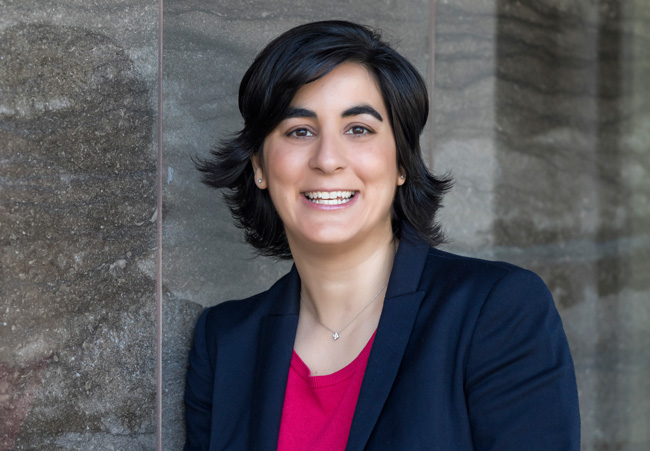
Earlier this month, Nathalie Tufenkji was named winner of the Award for the Support of Women in the Engineering Profession by Engineers Canada.
In a stellar career marked by numerous awards and accolades, the Engineer Canada honour is particularly appropriate for Tufenkji, a professor in the Department of Chemical Engineering, because she knows firsthand how important a mentor can be.
“I’ve wanted to be an inventor and scientist ever since I was a very young child,” says the Canada Research Chair (Tier 1) in Biocolloids and Surfaces. “However, as a child, I didn’t really know what an engineer did as I didn’t have any role models in my immediate circle. As a teenager, I became friends with a chemical engineer who was also my karate training partner. He became my mentor, encouraged me to pursue an engineering education and gave me my iron ring when I graduated from McGill in 1999 [with a Bachelor’s degree in Chemical Engineering].”
Paying it forward
Since returning to her alma mater as an assistant professor in 2005, has made it her mission to mentor female engineering students. “Supporting women to pursue a career in engineering is a major priority for me,” says Tufenkji, who also serves as Associate Director of the Brace Center for Water Resources Management.
“Over my 15-year career, I have recruited and trained more than 80 women in cutting-edge skills relevant to environmental engineering and nanotechnology. Female students and postdoctoral fellows trained in my laboratory have moved on to successful careers in industry, academia, consulting, or graduate studies.”
She is also the Faculty Advisor of the Society of Women Engineers at McGill. “We hope it will support generations of female engineering students,” she says.
Making an impact
“I chose a career in engineering because I wanted to make an impact by designing technical solutions to address global problems related to the environment and public health,” says Tufenkji. She has done just that.
In her research, Tufenkji addresses problems linked with plastic pollution and the spread of harmful bacteria. In May, she was named one of six recipients of a prestigious Killam Research Fellowship to focus on the global crisis of plastic pollution in soils and freshwater, a crisis that has been mostly ignored compared to marine research.
Tufenkji and her team’s project will be one of the first to evaluate the fate and impacts of microplastics and nanoplastics in terrestrial and freshwater ecosystems in a Northern Canadian context, using advanced analytical imaging technologies to quantify and identify microplastics and nanoplastics in real environments. Their innovative approaches will detect, quantify and characterize levels of plastic pollution in the size range of less than 0.01 mm, which has not been well studied due to a lack of robust methods.
Moving the needle
Tufenkji received more good news a few days after the Engineers Canada award. On June 15, she was one of fifty new Fellows elected to the Canadian Academy of Engineering (CAE).
In the CAE citation, Tufenkji was cited for “her exceptional contributions towards sustainable development of nanotechnology, solving problems linked with plastic pollution, and the control of harmful bacteria… She is very active in public outreach aimed at broadening appreciation for engineering as demonstrated by the global coverage of her discoveries. She is also a respected educator and leader in creating opportunities for women in the profession.”
Tufenkji says that while she did “experience challenges as a young woman in engineering and I continue to encounter new and different challenges as my career progresses,” she also “received considerable support and mentorship from different members of the community.”
“The needle is moving slowly,” says Tufenkji. “We need to commit to developing equitable, diverse and inclusive learning and working environments, to ensure the continued progression and world-class excellence of our engineering community.”
